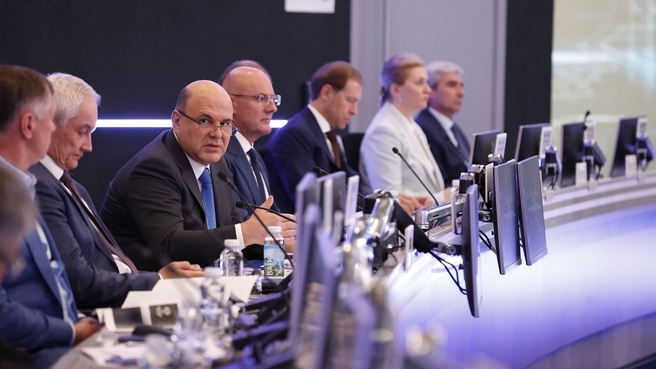Mikhail Mishustin: “Today, it is important that we draft a long-term construction programme in every region, coordinate all plans, conduct a quick inventory of unfinished projects and see what should be completed, and how much we will have to spend on this from all sources. We have drafted a package of measures for accomplishing these tasks. All of them are included in the draft strategy for developing the construction sector and the housing and utilities infrastructure.”
Mikhail Mishustin’s opening remarks:
Good afternoon, colleagues,
Today, we will review the situation in the sphere of construction, housing and utilities. These basic sectors provide people with permanent buildings, flats and the required infrastructure for a comfortable life. In turn, affiliated production facilities allow these sectors to operate at full capacity.
Speaking at the St Petersburg International Economic Forum, the President underscored the significance of these sectors for national economic growth and set forth a number of high-priority aspects, such as commissioning more new buildings, continuing the programme for relocating tenants from rundown and dilapidated housing, modernising the housing and utilities system and actively using the mechanism of infrastructure budget loans.
Mortgages remain a major driver of housing construction. Last year, we managed to achieve significant results in this sector, with loans of over 1.5 trillion roubles granted with a lower interest rate as part of the government-subsidised programmes.
The process has gathered momentum, and the President has instructed us to keep up our efforts and ensure that the volume of completed housing remains at least equal to last year's.
The Government is considering decisions necessary for us to achieve the set tasks. In June, we reduced the preferential mortgage interest rate to seven percent per annum.
We have also expanded the Far Eastern mortgage, whose recipients will now include teachers and healthcare workers who have worked in any region of the Russian Far East for at least five years, meaning that every year some 5,000 residents of the federal district will have the opportunity to improve their living conditions.
Systemic transformation is an essential area in the development of the construction industry, including through the introduction of digital tools that use domestically-developed technologies. We need to move the main procedures to electronic format for greater transparency.
The duration of the construction and investment cycle has decreased as well, which will allow us to speed up construction work, reduce the burden on business, and simplify interaction between companies and all government agencies.
Efforts should also be taken to create a fair competitive environment in the industry, an essential aspect for succeeding here. The major areas include increasing the level of market participants’ professionalism, improving construction safety, involving qualified specialists, and developing a solid scientific base.
Providing comfortable living conditions requires properly operating utility systems. And, of course, we can see that many problems have accumulated in this sector over the years that require immediate solutions.
The President has instructed us to draft a programme for modernising the housing and utilities sector and to synchronise it with other infrastructure development plans, as well as with those for overhauling residential buildings. It is important that we thoroughly analyse the parameters of this document and determine its sources of funding. We will have to start implementing it in 2023.
This comprehensive approach will have a multiplication effect on the economy and will enable many affiliated sectors to operate at full capacity. It will also stipulate an easy-to-understand and transparent system of utility services rates for residents and businesses.
It is also necessary to continue working to create a people-friendly urban environment, including in small towns and historical communities. Last year, more of them were able to participate in the nationwide competition for the best urban improvement projects. The President suggested providing more resources for these projects because with these grants, the winners will be able to realise their ideas, change the image of many communities, and improve their quality of life. I have seen a number of projects and, to be honest, I cannot help but feel happy about the creative zeal of the architects and other participants. This year, we will also attend the competition finals.
The implementation of all tasks in the construction sector and the housing and utilities infrastructure requires substantial budgetary funding. It is important that we closely monitor the cost-effective spending of these allocations.
We need to involve investors and private investors more actively in this work. We have created numerous tools, including concessions and public-private partnerships, for such cooperation.
The regions will also be able to use the mechanism of infrastructure budget loans to resolve problems that have accumulated in the field of comprehensive housing construction projects and the housing and utilities sector. Virtually all Russian regions, 83 to be more exact, have received these loans worth one trillion roubles.
Today, it is important that we draft a long-term construction programme in every region, coordinate all plans, conduct a quick inventory of unfinished projects, and see what should be completed and how much we will have to spend on this from all sources.
We have drafted a package of measures for accomplishing these tasks. All of them are included in the draft Strategy for Developing the Construction Industry and Housing and Utilities until 2030 with a forecast to 2035, which was discussed in great detail at a meeting of the State Council Presidium in June. Marat Khusnullin, the Minister and all affiliated sectors have accomplished a lot.












